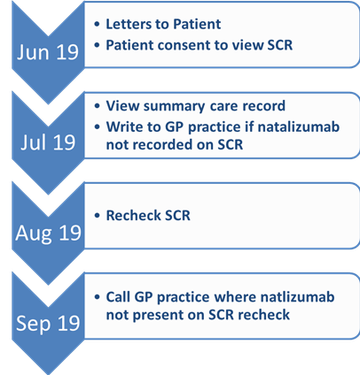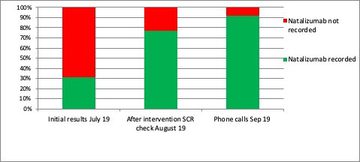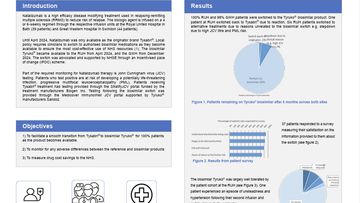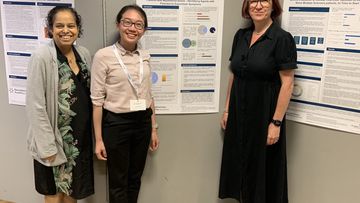Improving natalizumab recording in Primary Care Records in relapsing remitting MS
1. Background and Aims
Natalizumab is a highly effective disease modifying treatment (DMT) for relapsing-remitting multiple sclerosis (MS), it is given by monthly intravenous infusion in our Neurology Day Unit. The MS Team aim to ensure clear documentation of this treatment in patients’ Summary Care Record (SCR) or record of current medication, as there are important safety considerations for prescribers, particularly in relation to considering other medications including immunosuppressants and vaccinations.
2. Objective of Audit
NHS England states that summary care records should contain a complete and up-to-date list of all medication prescribed for an individual. We hoped to ensure that all of our patients receiving natalizumab had this recorded in their SCR.
3. Method
There are currently 35 patients receiving natalizumab from the Neurology Day Unit at South Tees Hospitals NHS Foundation Trust. All were provided with written information about this audit when arriving for infusions and were able to choose whether they wished participate. All patients chose to consent to checking of their SCR on 2 occasions as described in the patient letter, see appendix 1.
Where it was found that natalizumab had not been recorded in the patient’s SCR, a letter was sent to their GP practice asking for this to be completed, see appendix 2. The patient’s SCR was then rechecked after one month. Where natalizumab was still not visible in the patient’s SCR, this was followed up with a phone call.
Where patients did not have a SCR, the GP practice was contacted by telephone, where natalizumab was found to be not recorded on the patient’s current medication, a letter was sent asking the GP practice to add this, see appendix 3, this was then confirmed with a further telephone call.

4. Results
| Measure of quality | Standard | 1st SCR check Date: 07/19 | 2nd SCR check Date: 08/19 | Phone call Date: 09/19 |
| All patients should have natalizumab recorded in their SCR/medication record | 100% | 31% | 77% | 91% |
Natalizumab Recording in Patient’s Primary Care Medication Record, South Tees Hospitals NHS Foundation Trust

5. Discussion
It can be seen that this intervention improved natalizumab recording in SCRs from 31% to 91%. Of the 3 patients that still did not have natalizumab recorded in their summary care records, however, the GP practices advised that since they were now in receipt of this communication that this would be actioned.
Moving forward it is essential for patient safety that DMTs should be clearly recorded in primary care records of current medication. The process was fairly time consuming and it would not be possible to call every patient’s GP practice for all DMTs, however the MS team routinely write to the GP when they reissue prescriptions for a DMT.
It may then be possible to add the line, ‘please ensure *insert name of DMT* is documented in the patient’s summary care record as a ‘prescribed elsewhere’ item to ensure that all prescribers have a complete list of all medication when considering the patient’s care.
6. Actions
Advise add the line, ‘please ensure *insert name of DMT* is documented in the patient’s summary care record as a ‘prescribed elsewhere’ item to ensure that all prescribers have a complete list of all medication when considering the patient’s care.

More Neuropharmacy Academy Medication Projects


Developing neuropharmacists, supporting collaborative care
Knowledgeable pharmacists can initiate or support new treatment pathways, play an important role in patient education, medicine adherence, efficacy and safety, and provide advice to other healthcare professionals involved in the person's care. This Academy recognises the value of this essential role, and seeks to enhance pharmacist's clinical skills and build their confidence in managing a range of neurological conditions.